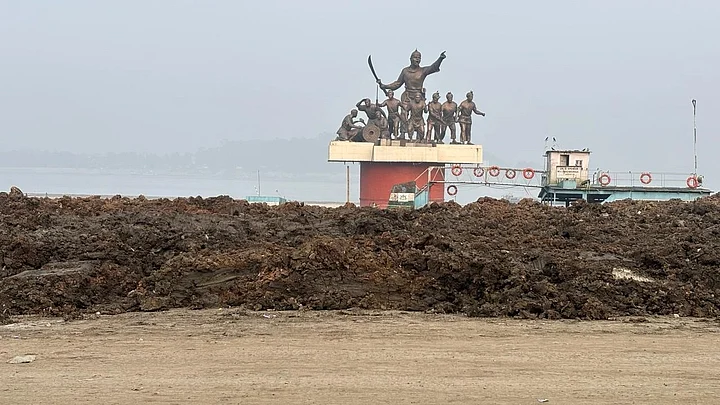(This is the first in a series of insightful reports from the ground, titled The Race From India to Bharat. The author travels all across India as 960 million voters get ready to celebrate the largest festival of democracy in the world: the 2024 Lok Sabha elections. What do ordinary Indians think and feel about the past, present, and future of India? Are they convinced that the old fault lines are healing?)
There is a wary silence on the streets as our SUV slowly navigates the neighbourhood. For the nth time, the author gets down from the car and attempts a conversation with the folks strolling around; or with shopkeepers. No luck. The only response I get is a cheerful smile and a short speech from a shopkeeper named Taslimuddin who says all is well and nobody in Nellie is interested in even talking about politics.
Anxious not to appear intrusive, I asked Taslimuddin if I should stop asking people questions and leave the place. He nods sagely, the outer symbols of his Muslim identity on full display, and says: Aap to thodi der pehle Nellie thana gaye thei (You went to Nellie Police Station some time back).
I had indeed gone there to converse with the cops about the situation in Nellie more than 40 years after about 3,000 Muslims were butchered in a night of frenzied killings.
I told Taslimuddin that I just wanted to know if justice had been done to those 3000 dead Muslims. He smiled again and said that justice is in the hands of Allah, and urged me again to move on. By this time, a curious gaggle of teenage and young boys had gathered near the shop, a common sight in India. I wished Taslimuddin well and moved on.
As the SUV exited Nellie, my driver Bhaskar Keot flashed an expression that said: I had told you no one will talk. Bhaskar is about 22 years old and is a commerce graduate. He worked for a year after his graduation as an accountant at a salary of Rs 22,000 per month before giving it up. He prefers driving and is thinking of becoming a taxi service entrepreneur. At the moment, he works for a man named Sajid who has been involved in a taxi service for decades.
Bhaskar is not reticent. He says Miyas have become less arrogant after the BJP (Bharatiya Janata Party) came to power in the state. His house is close to Nagaon, a cosy double-story affair with a car parked in the driveway. His mother gifts a traditional Assamese gamcha even as their pet Labrador Siri tries climbing all over me. Bhaskar clearly belongs to a bona fide middle-class family. His father is a retired headmaster. The author realises very soon there is no need to ask who his family will vote for in the coming elections.
In the 2019 Lok Sabha elections, Pradyut Bordoloi of the Congress party narrowly defeated Rupak Sharma of the BJP by about 16,000 votes.
Forget the election results. The author was clear even before saying his long pan-Indian journey that he would focus as much on the changing India or Bharat as on politics. The most visible manifestation of the journey from India to Bharat is seen on the banks of the Brahmaputra River in Guwahati. There is a slightly fraying green board saying Azan Peer Park as the vehicle moves from the main road towards the banks. Signs of furious construction work are everywhere.
At a distance, touching the waters of the Brahmaputra are statues of many warriors. One of them with a long sword towers over the rest. Bhaskar is eager to become a guide and tell me the history behind the statue. He looks disappointed when I tell him I already know all about Lachit Borphukan, the Ahom warrior general who created history about 350 years ago at Saraighat on the banks of the river. The Ahom army led by Borphukan defeated the Mughal army of Aurangzeb so decisively in 1671 that they never came back.
For some strange reason, Lachit Borphukan was missing from local history books and discourse. He is now back with a vengeance and most of Assam feels proud of their long-gone hero. On 9 October 2023, Assam Chief Minister Himanta Biswa Sharma unveiled his statue and promised his fellow Assamese people that his government will make efforts to ensure that Lachit Borphukan is treated all over India the way Shivaji and Maharana Pratap are.
Many people in Assam are not happy at all with the turn of events, particularly since Himanta became the chief minister and a Hindutva champion. They fear his aggressive push for Ahom and Hindu nationalism will create an Assam where the Muslims will effectively become second-class citizens. Some feel that they already have.
There is not enough space for the author to analyse all this in detail. But I personally feel things could either way: Hindus and Muslims can figure out a way to live and let live or Hindutva will triumph and Muslims will be confined in their ghettos.
But Assam is not just about rediscovering Hindu pride. Like elsewhere in India, there is a dramatic improvement in infrastructure. I could not believe the quality of the roads while driving from Guwahati to Nagaon and then to Bongaigaon. Besides, the last time the author was in Guwahati in 2015, the power cuts would be frequent and long. In the two nights I spent here this time, there was no power cut.
(Sutanu Guru is the Executive Director of the CVoter Foundation. This is an opinion article and the views expressed above are the author’s own. The Quint neither endorses nor is responsible for them.)
